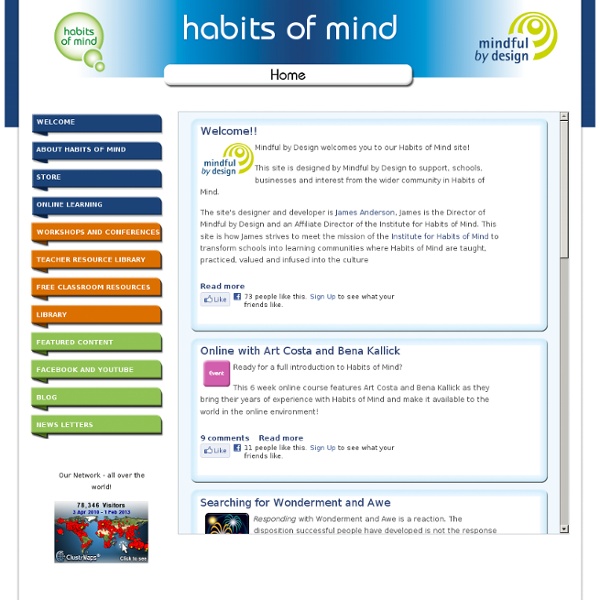



Integrating the 16 Habits of Mind In outcomes-based learning environments, we generally see three elements in play: 1) learning objectives or targets are created from given standards; 2) instruction of some kind is given; and then 3) learning results are assessed. These assessments offer data to inform the revision of further planned instruction. Rinse and repeat. But lost in this clinical sequence are the Habits of Mind that (often predictably) lead to success or failure in the mastery of given standards. Below are all 16 Habits of Mind, each with a tip, strategy or resource to understand and begin implementation in your classroom. The habits themselves aren't new at all, and significant work has already been done in the areas of these "thinking habits." And a renewed urgency for their integration. The Habits of Mind by Art Costa and Bena Kallick don't simply represent fragments of practice to "add on" to what you already do, but rather new ways to think about how people learn. 1. 2. 3. 4. 5. 6. 7. 8. 9. 10. 11. 12. 13.
Using The Habits Of Mind To Promote Teacher Happiness by Arthur L. Costa and Bena Kallick, Institute for Habits of Mind A Whole Child Deserves A Whole Teacher: Using The Habits Of Mind To Promote Teacher Happiness A lot is said and written about the whole child. We often forget, however, that we should be considering the whole adult as well. These are the questions that arise as teachers work in their classrooms every day. To develop the whole child, teachers need Habits of Mind that help them problem solve, become better critical thinkers, and communicate– to become whole teachers who manage their social, physical, emotional, and cognitive skills as they respond and interact with their students. Image attribution flickr user frontierofficial
TodaysMeet Habits Of Mind Step 1 – Valuing Habits of Mind for yourself: For the Habits of Mind to have meaning for students they have to have meaning for teachers. Exploring and unpacking what is meant by each of the sixteen habits means to you and your colleagues is a great place to begin. Once teachers see the value of the Habits, it is easier and more authentic to help our students see their value. Eg: Persisting: When have you had to persist in your professional work? Step 2 – Direct instruction in Habits of Mind Teach the students about each of the Habits of Mind in turn. Step 3 – Infuse Step 5 - Habits of Mind across the curriculum No one is expected to focus on all sixteen habits, all of the time. Eg Learning like a mathematician Several years ago I visited a maths departments in a secondary school who were choosing one Habit of Mind to focus on. Step 4 - Habits of Mind at the centre of learning: If schools are the home of the mind, then the Habits of Mind must be at the centre of learning.
De rol van de laatste 3 Hoe interessant zijn de Habits of Mind 1-9-7 in relatie met transformeren? Deze vraag kreeg ik van mijn trajectbegeleidster naar aanleiding van mijn post: Essenties en habits of mind koppelen aan “systeem transformeren” en “principegestuurd ondernemend leren” Eentje die me flink bezighoudt, die me afleidt van mijn studieboek. Dus toch maar eerst een poging doen om hem te beantwoorden. Het gaat om de volgende drie habits: Managing impulsivityTake your Time! Be clear! Striving for accuracyCheck it again! Mijn primaire reactie was: niet. Ik begon met ter inspiratie te googlen op accuracy en verandering/transformatie. Net zo fascinerend als het vorige. De mate van zelforganisatie hangt samen met de kracht van de kernideologie. Kijk nog eens naar hoe dat gaat in de tuin. En antwoord: Transformatie van een systeem komt niet vanzelf.
Technology & Media Ideas for the Higher Ed Classroom Habits of Mind In 2008 zijn directie en bestuur op studiereis naar Amerika geweest om inspiratie en ideeën op te doen. Ze hebben verschillende scholen bezocht, waaronder de Mission Hill K-8 School in Boston. Daar hebben zij voor het eerst kennis gemaakt met een onderdeel van de habits of mind. Het onderzoeken van problemen door het stellen van goede vragen is slechts 1 van de 16 habits die er beschreven zijn. “Jarenlang is er onderzoek gedaan naar wat mensen succesvol maakt. De 16 Habits staan uitgebreid beschreven in het boek "Learning and leading with Habits of Mind" door Art Costa en Bena Kallick. 1. Bijdrage:Tekst: Rinke HuismanIllustraties: Nina Hazenoot Bijdrage: Tekst: Rinke Huisman, Debby van der Putten Illustraties: Nina Hazenoot
Websearch: Habits of the mind In het kader van mijn online-traject “Essenties in de praktijk, stel ik me steeds meer nieuwsgierige vragen rondom de essentie: je gebruikt je hersenen goed. Vraag me af als je je hersens goed gebruikt, welk gedrag/gewoontes ontwikkel je dan. Moest denken aan de webpagina van essentieel leren rondom de 16 habits of Mind. Ik hoorde hier de schrijver aan het woord. Hier vond ik deze prachtige visualisatie. Op deze webpagina legt in een video professor Costa alle gewoontes uit. Ik ben ze mbv de Yurls allemaal even “langsgegaan”. Helder en precies denken en communiceren. Enfin, ik zie de gewoontes nu wel voor me. Ontwikkelingen na het publiceren van deze post. @Ilsemeelberghs In Pearltrees had ik ook al wat verzameld rondom “Habits of mind” Dat doe ik en omdat ik een bijdrage wil leveren zoek ik nog even verder en vind een fijne wiki.
Websøk Hå folkebibliotek: Hå folkebibliotekDalvn. 21, 4365 NærbøNettside: 51 79 36 80 Varhaug filial: Hå folkebibliotek avd. VarhaugEikevegen 5, 4360 VarhaugNettside: 51 79 17 08 Nærbø bibl.: Hå folkebibliotekBesøkadresse: Dalv. 21Postadresse: Postboks 174, 4369 NærbøNettside: 51 43 40 11Fax: 51 43 40 09 Ogna filial: Hå folkebibliotek avd OgnaNordsjøvegen 4331, 4364 SirevågNettside: 482 60 433E-post: bibogn@ha.kommune.no Vigrestad filial: Hå folkebibliotek avd. VigrestadBesøkadresse: Nymannsvegen 2, 4362 VigrestadPostadresse: Boks 74, 4369 VigrestadNettside: 51 79 36 07Telefaks: 51 79 35 97 E-post: biblioteket@ha.folkebibl.no eBokBib